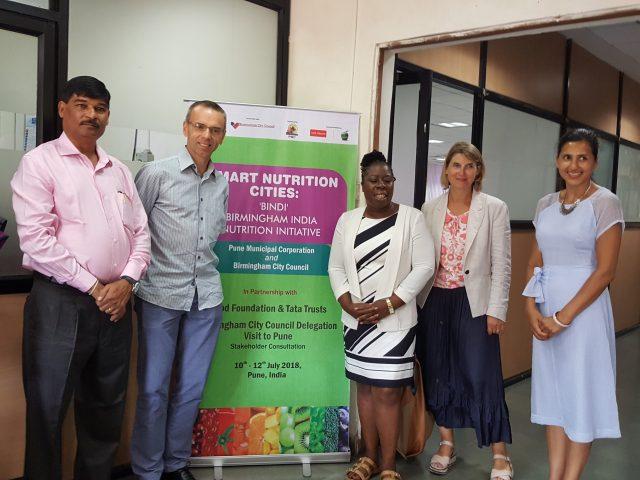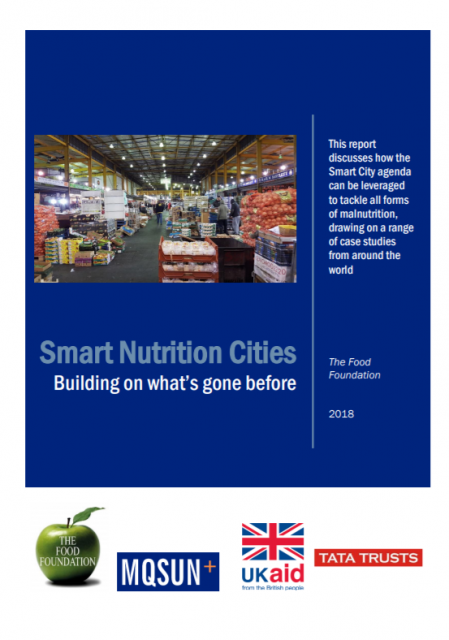The Food Foundation is proud to work closely with Birmingham Public Health on their ambition to become a healthy and sustainable food city, where all citizens can access and afford healthy, ethically produced food and where food businesses can thrive.
BINDI: A “Food Smart City” initiative and learning partnership
The Food Foundation facilitated a learning partnership between Birmingham, UK and Pune, India which involved the development of policies and practices as part of a “Food Smart City” initiative. Food Smart Cities use data and technology to change the way that food is produced, processed, distributed and consumed. Birmingham and Pune have a common ambition to seize opportunities to support safer, healthier and more sustainable city food environments which prevent malnutrition in all its forms (overweight, obesity, micronutrient deficiencies and undernutrition). The focus of the partnership is on policies regarding food prepared out of the home – to encourage that food which is available and promoted is safe, nutritious, affordable and procured in a manner which supports environmental sustainability and local economic development.

Case study report of smart food and nutrition initiatives
The partnership was launched through events in Birmingham and Pune. In the first 18-month phase, The Food Foundation worked with local authorities in both cities to design the partnership, based on citizen engagement and evidence from elsewhere around the globe. We produced Situational Analysis Reports for both Birmingham and Pune which compiled secondary data on the nutrition situation in both cities to inform the partnership. We also produced a Case Study Report of other smart food and nutrition initiatives which have taken place elsewhere to inspire the local authorities in Birmingham and Pune.

Citizen engagement to inform city led food strategy
In 2019 we implemented citizen engagement plans to understand households’ Out of Home eating behaviours and the extent to which they support healthy or unhealthy diets. In Pune, a household food survey was conducted with over 3,000 adult citizens. Pune Municipal Corporation (PMC) Auxiliary Nurses were trained by researchers at the Gokhale Institute of Politics and Economics. The main findings from the survey which explored eating habits, understanding of healthy food and policy changes showed that citizens need help to secure healthier diets.
Birmingham also began citizen engagement activities in 2019, to consult people on the development of their food strategy. The launch of the Birmingham Food Conversation was also used as the launch of the National Food Conversation as England began work to prepare for the National Food Strategy. The city produced a video to encourage people to respond to an online survey on their food choices and also commissioned food focus groups. Though this work was interrupted by the Covid-19 pandemic, the city gathered insight from the responses they received.
In 2021, we have continued the process of stakeholder engagement to inform the development of the city's food strategy, which will be going to public consultation later in the year. This has included holding a UNFSS Dialogue with a wide selection of stakeholder.
Lessons Learnt
The BINDI partnership produced some valuable learning on international partnerships. These have been captured in two reports:
Responding to the Covid-19 emergency
Both cities shared a similar approach when responding to the Covid-19 emergency. Case studies and videos have been produced highlighting partnerships with the voluntary sector to ensure emergency food aid was delivered to communities and families in need. As both Birmingham and Pune are MUFPP signatory cities, the videos have been featured as part of “Milan Pact Talks” sharing practices from across the world.
Expanding the learning Partnership
The BINDI initiative was funded by the Tata Trusts and the UK Department for International Development (DFID) through its Maximising the Quality of Scaling Up Nutrition Plus (MQSUN+) project. MQSUN+ provides technical expertise in multisectoral nutrition policy and programming to DFID and Scaling Up Nutrition countries.
The Food Foundation secured additional funding from the UK Foreign, Commonwealth and Development Office (FCDO) to expand this partnership as part of their Global Food System project. The Food Cities 2022 initiative was launched in January 2021 and a learning platform has been developed to share resources, case studies and more to support those developing food policies/strategies.



